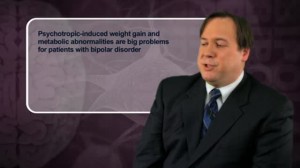NEW YORK (Reuters Health) – More children with bipolar I disorder (manic or mixed phase) respond to the antipsychotic risperidone than to lithium or the anticonvulsant divalproex sodium, a multicenter team reports in the Archives of General Psychiatry online January 2.
However, risperidone “is associated with adverse effects such as weight gain and hyperprolactinemia that raise concern for long-term treatment,” the authors found. “Pursuing a safer and more efficacious intervention for childhood mania remains a research priority.”
Dr. Barbara Geller, with Washington University in St. Louis, Missouri, and colleagues note that childhood mania seriously impairs the patient and often continues into adulthood, but there have been only a few studies of antimanic agents in children.
They therefore conducted a trial involving 279 children aged 6 to 15 years with a DSM-IV diagnosis of bipolar I disorder, manic or mixed episode, for at least 4 consecutive weeks immediately preceding enrollment. They were randomly assigned to 8 weeks of titrated treatment with lithium, divalproex sodium, or risperidone.
The patients, family members, and treating clinicians were aware of the assigned treatments, the authors explain, but baseline and endpoint assessments were made by independent, blinded evaluators.
Response rates measured on the Clinical Global Impressions for Bipolar Illness Improvement–Mania scale were significantly lower with lithium (35.6%) or divalproex sodium (24.0%) than with risperidone (68.5%; p<0.001), the investigators found.
Regarding side effects, the mean increase in BMI was 0.37 for patients treated with lithium, 0.35 for those receiving divalproex sodium and 1.37 for subjects assigned to risperidone, the report indicates. Also, prolactin increased from 7.2 to 44.8 ng/mL in the risperidone group but was almost unchanged in the other two arms of the study.
On the ECG, there was a significant increase in the QT interval in the risperidone and lithium groups, and a significant increase in the QRS duration in the divalproex arm, Dr. Geller and colleagues report.
Summing up, they conclude, “Although the response rate was significantly higher in the risperidone group, weight gain, BMI increase, and presence of hyperprolactinemia were significantly worse. These metabolic factors and electrocardiographic changes observed in the lithium and divalproex sodium groups require monitoring.”
SOURCE:
Arch Gen Psychiatry 2012.




